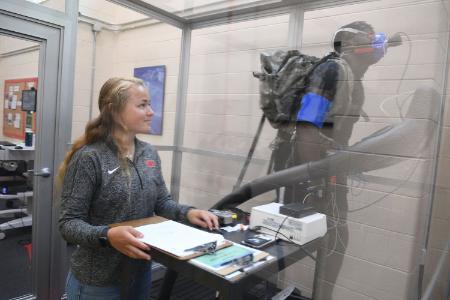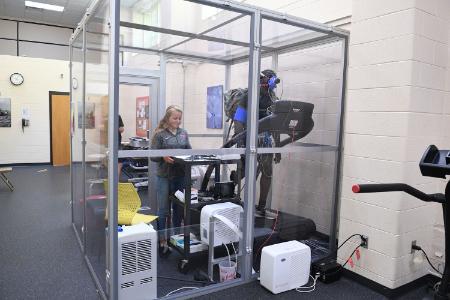SURI: Heavy Loads and Harsh Environments – The Effects on the Human Body

LEXINGTON, Va. July 21, 2023 — Caroline Lassalle ’25 has always had a strong desire to learn about exercise science and work in the medical field. The biology major spent five weeks last summer becoming a certified emergency medical technician (EMT) at Virginia Military Institute.
“After a year of having my EMT certification, I wanted to try something new, so I started to consider research opportunities,” she said.
 As part of the Summer Undergraduate Research Institute (SURI) program, she’s investigating the effects of load carriage — a 65-pound ruck sack — on metabolism, ventilation, and tissue oxygenation at both sea level and stimulated altitude (above 12,000 feet), using a hypoxic chamber. With a hypoxic chamber, the oxygen levels can be altered, which mimics high altitudes.
As part of the Summer Undergraduate Research Institute (SURI) program, she’s investigating the effects of load carriage — a 65-pound ruck sack — on metabolism, ventilation, and tissue oxygenation at both sea level and stimulated altitude (above 12,000 feet), using a hypoxic chamber. With a hypoxic chamber, the oxygen levels can be altered, which mimics high altitudes.
“Through SURI, I hope to gain a deeper understanding of the performance of the human body under harsh external conditions and a newfound love of learning in the form of research,” she said.
SURI is offered by the VMI Center for Undergraduate Research (VCUR) and provides cadets with a unique opportunity to delve into high-level research that relates to their degree path. It consists of cadet-led research under the direction of a faculty advisor.
As a biology major with a minor in chemistry and exercise science, she decided to reach out to the Department of Human Performance and Wellness at VMI for the research opportunity. From there, she was introduced to Maj. Daniel Baur, assistant professor in the Department of Human Performance and Wellness, who has researched the effects of heavy load carriage and altitude. He was planning on conducting further research this summer.
According to Baur, the project is ongoing work in his research line. He’s already completed two studies and the current study seeks to answer questions from prior work. Although the study concept and design were in place prior to Lassalle coming on board, Baur said she got up to speed rather quickly and began to develop questions of her own based on the data collected.
“Working with Major Baur has been a great experience,” she said. “It is a unique opportunity to not only learn something new about the performance of the human body under harsh conditions but to also see and understand it in the lab.”
She devoted 10 weeks of research work this summer toward the project, which included six visits to the exercise physiology lab in Cormack Hall, testing 14 subjects.
 Baur’s hope from the research is to enhance the safety and effectiveness of the United States’ warfighters, focusing on how load carriage may influence risks and overall performance. He said that for most infantry units, average total loads of more than 80 pounds are common. Carrying loads like this has several negative physiological effects due to the compression on the chest and shoulders of those carrying them. Those risks or strains are heightened as altitude increases.
Baur’s hope from the research is to enhance the safety and effectiveness of the United States’ warfighters, focusing on how load carriage may influence risks and overall performance. He said that for most infantry units, average total loads of more than 80 pounds are common. Carrying loads like this has several negative physiological effects due to the compression on the chest and shoulders of those carrying them. Those risks or strains are heightened as altitude increases.
“The relative lack of oxygen at high altitude increases the physiological challenge and health risks,” Baur said “Specifically, exercising at high altitude exacerbates the risk for altitude illnesses like acute mountain sickness and high altitude pulmonary edema.”
Since the study is complex and involves human research participants and a number of variables, Baur and Lassalle have been working together closely. They have defined roles in the experiment, Baur said.
“Caroline is responsible for being inside the altitude chamber with study participants and doing all the hands-on data collection. I monitor the data being collected on various computers and manage oxygen levels in the chamber,” he said. “Importantly, Caroline learned very quickly from initial training in the use of all equipment, and I have complete trust in her effective completion of all study tasks during experiments. This is obviously a great relief to me as it frees me up to focus on remaining tasks and overall quality control.”
Lassalle has been independent in study administration, where she is responsible for recruiting, scheduling, and managing all study participants. Subjects must visit the lab on six different occasions, totaling 90 minutes per session, after following a strict exercise and dietary control plan. Overall, Lassalle will have more than 120 hours of data collection experience when SURI is over.
The SURI program has given Lassalle great insight and respect for the research process.
“I believe the SURI program is important at VMI because of the unique opportunity to dedicate time toward just one area of study for a few weeks of the summer,” she said. “During the school year, I would find it very difficult to conduct research on top of academics, cadet leadership positions, and military training. SURI gives cadets an opportunity to focus and dive deep into one area of study while building a relationship with professor-mentors.”
Baur said he’s been fortunate to work with Lassalle on this project. Although he hasn’t had her as a student, she has proved herself to be a great partner to work side-by-side with and has proven herself an impressive researcher.
“From day one, she has carefully listened and taken notes on all research procedures allowing her to quickly become self-sufficient in managing all laboratory equipment,” he said. “She has also shown impressive initiative, completing most tasks without being asked to, and some even I may have missed [or] did not consider.”
Laura Peters Shapiro
Photos by Kelly Nye
Communications & Marketing
VIRGINIA MILITARY INSTITUTE
.svg)
.png)